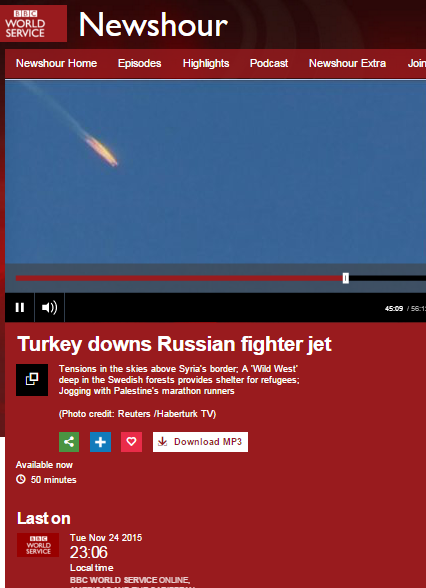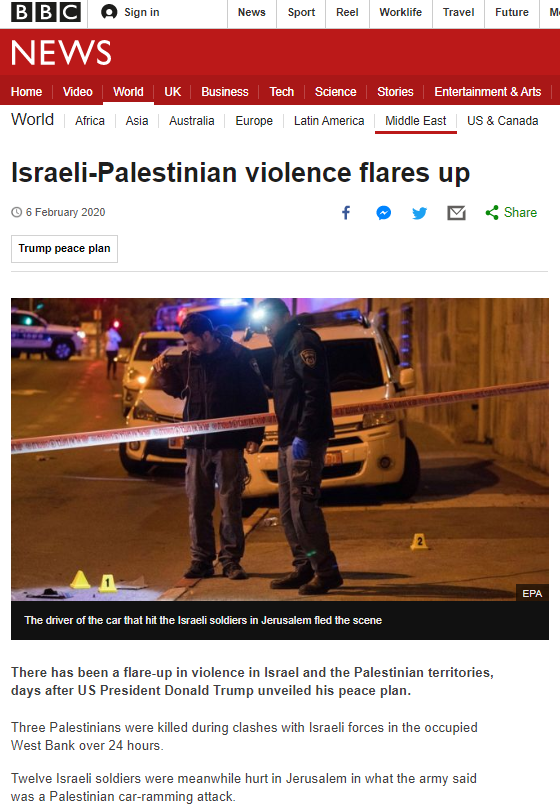Since late October much of the BBC’s Israel-related subject matter has been focused on the surge in terror attacks and violence, with an integral part of that coverage being ‘explanations’ to BBC audiences of its supposed causes. As was noted in a previous post concerning BBC coverage of the November 18th terror attack in Har Nof, the factors promoted by the BBC as causes for that attack included (in reverse order of frequency) ‘discrimination’ against Arab Jerusalemites, a ‘cycle of violence’, supposed ‘attacks’ on or threats to Al Aqsa Mosque by Jews, the absence of negotiations between Israel and the PLO, the Gaza casualty toll of the summer conflict, the campaign for equal prayer rights at Temple Mount and ‘settlements’.
The fact that so many and such varied factors were promoted as being the cause of “tensions” which, according to the BBC led to two Palestinians carrying out a brutal terror attack on early morning worshippers at a synagogue, of course indicates that the promotion of one factor or another in BBC reports depended very much upon the particular journalist.
In contrast, the subject of incitement and glorification of terrorism by Palestinian functionaries and official Palestinian sources was presented uniformly and exclusively in the form of second-hand quotes, with the BBC making no effort whatsoever to independently inform audiences of those factors and their role in the creation of “tensions”.
In this post we will take a broader look at BBC coverage of other incidents which took place between late October and late November and examine the narrative promoted in the reports below.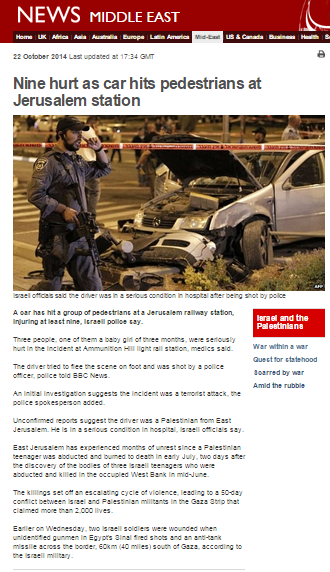
October 22nd: terror attack on light rail passengers, Ammunition Hill, Jerusalem.
BBC News website: Jerusalem car ‘attack’ kills baby at rail station (discussed here)
October 23rd:
BBC News website: Israel’s Netanyahu accuses Abbas over Jerusalem car attack (discussed here)
October 25th:
BBC News website: US urges probe after teenager shot dead in West Bank (discussed here)
October 26th:
BBC News website: Jerusalem: Palestinian car attack claims second victim (discussed here)
October 29th: shooting of Yehuda Glick in central Jerusalem.
BBC News website: Jerusalem holy site closure ‘declaration of war’ – Abbas (discussed here)
October 30th:
BBC News website & television news: Abbas: Mosque closure a ‘declaration of war’ Quentin Sommerville (discussed here)
BBC World Service ‘Newshour’ (discussed here)
October 31st:
BBC News website: Jerusalem holy site is reopened amid tension (discussed here)
November 5th: terror attack on light rail passengers & pedestrians, Shimon Hatsadik, Jerusalem.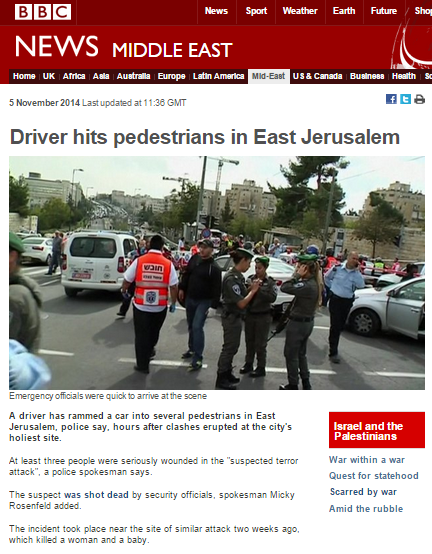
BBC News website: Jerusalem: Palestinian van attack kills policeman (discussed here)
BBC News website & television news: Driver hits pedestrians in East Jerusalem Yolande Knell
BBC World Service ‘Newshour’ 1 (discussed here)
BBC World Service ‘Newshour’ 2 (discussed here)
November 6th:
BBC World Service ‘WHYS’ (discussed here)
November 7th:
BBC News website: Israel to destroy homes of Palestinian Jerusalem attackers (discussed here)
BBC World Service ‘Outside Source’ (discussed here)
BBC News website: Jerusalem a city on edge as tensions spiral Yolande Knell (discussed here)
BBC News website & television news: Growing tension at Jerusalem holy site Yolande Knell
November 8th:
BBC Radio 4 ‘From Our Own Correspondent’ (discussed here)
November 10th: terror attacks in Tel Aviv and Gush Etzion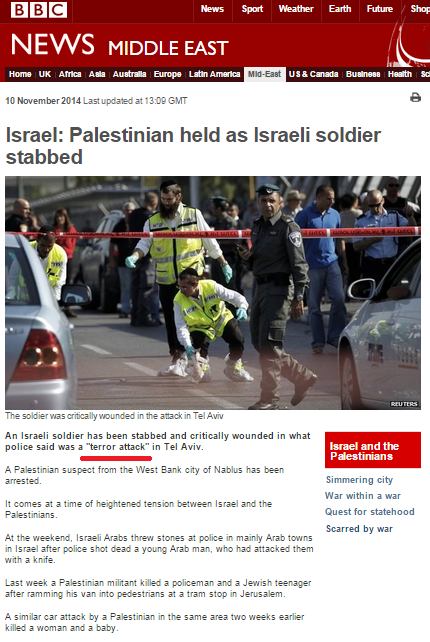
BBC News website: Israel: Palestinian held as Israeli soldier stabbed and Israeli woman and soldier killed in two knife attacks (both discussed here)
November 13th:
BBC News website: Jerusalem tension: John Kerry brokers Israel-Jordan talks (discussed here)
November 14th:
BBC News website: Jerusalem tension: Israel ends age limit on holy site access (discussed here)
November 21st:
BBC News website: Israel: ‘Hamas plot to kill FM Lieberman foiled’ (discussed here)
November 28th:
BBC Radio 4 ‘Today’ (discussed here)
As was the case in BBC coverage of the Har Nof terror attack, any use of the word terror or its derivatives in the above reports came in the form of quotes from (mostly) Israeli or American officials and in inverted commas. On no occasion did the BBC independently identify the incidents as terror attacks or the perpetrators as terrorists.
Likewise, all mentions of incitement propagated by Palestinian leaders in the above reports were presented to BBC audiences in the form of quotes from Israeli officials: no independent reporting on that issue was provided by the BBC.
In addition to the factors presented as causing “tensions” – and hence terrorism – appearing in the reports on the Har Nof attack, in the reports above a number of additional factors were to be found. On two occasions audiences were told that “tensions” had risen because Israeli security forces had killed Palestinians, on three occasions they were informed that “tensions” had risen because Israel had confiscated or demolished Palestinian homes (with no context provided) and on eleven occasions audiences were told that age restrictions and/or the closure of Temple Mount were the cause of “tensions”.
Once again the prime factor promoted by the BBC as context for the surge in violence and terror attacks was ‘settlements’. Taking the above articles together with the coverage of the Har Nof attack, we see that factor has been promoted by the BBC more than any other. Like the vast majority of the additional factors presented by the BBC, that one too would be perceived by audiences as Israeli action and thus the underlying message is that Palestinian violence and terrorism is attributable to rising “tensions” caused almost exclusively by Israeli actions.
Another interesting aspect of the framing seen in BBC reporting was that of the use of political labelling – or not. The people (according to the BBC’s narrative) driven to violent rioting and terror attacks on civilians because of “tensions” caused by a campaign for equal prayer rights for non-Muslims at a site holy to Christians, Jews and Muslims alike – and those inciting them to such actions – were not afforded any kind of political label in any BBC report.
In contrast, the BBC did find it necessary to describe to its audiences on numerous occasions the assumed political affiliations/stances/opinions of the people visiting Temple Mount and/or the people campaigning for equal rights there for people of all faiths, as can be seen in the few examples below.
“Jews are allowed to visit the site but not to pray there. Now some right-wing religious groups say Jews should be allowed to pray – a demand which causes anger and unease in the Muslim world.” (source)
“Fears that Israel is set to legislate to remove the ban have led to furious scenes as Palestinian Muslims try to block visits by parties of far-right, religious Jews escorted by Israeli police.
“We love it when it is calm to pray but the Israeli government is not helping the situation by sending right-wing extremists and ministers to visit,” says Omar Kiswani, director of al-Aqsa mosque.”
“On Thursday, a week after the attempted murder of a prominent right-wing Jewish activist, Rabbi Yehuda Glick, there was a rally by his supporters.” (source)
“A Palestinian suspected of shooting and wounding a prominent right-wing activist, Rabbi Yehuda Glick, in Jerusalem at the end of last month was also shot dead in a gun battle with Israeli police.” (source)
On other occasions, the campaign for equal prayer rights at Temple Mount was inaccurately portrayed as an “Orthodox” issue.
In earlier reports, audiences were sometimes provided with information about the links of some of the perpetrators to terrorist organisations – although of course they were not described as such. For example:
“Shaloudi was the nephew of a leading bomb-maker from Hamas, the Islamist militant group opposed to Israel, who was killed in the West Bank in 1988.” (source)
“Police say Hejazi belonged to the Islamic Jihad militant group and served time in jail in Israel before being released in 2012.” (source)
“The driver of the van – named as Ibrahim al-Akari – was from Shuafat refugee camp in the east of the city, police said.
His Facebook page states that he is a member of Hamas, and the Twitter account for the group’s armed wing, the al-Qassam Brigades, described him as a member and a martyr.” (source)
As time went on, however, those links were downplayed in later reports by means of statements such as the ones below:
“…the attacks appear spontaneous: the acts of individuals, not organisations.” (source)
“BBC Middle East correspondent Kevin Connolly says there has been no real pattern to the recent spate of attacks – the attackers appear to have acted suddenly, meaning there is no advance intelligence to forewarn the authorities.” (source)
BBC reporting on the surge of violence and terror during October and November 2014 was largely limited to fatal attacks, with dozens of other non-fatal incidents ignored. As we see, the reports adhered to a specific template which ‘explained’ events by attributing them to “rising tensions” caused almost inevitably by Israeli actions.
For over a month, audiences have been provided with a picture of Israeli action and Palestinian reaction: a narrative which includes no Palestinian responsibility or agency and is carefully framed to exclude one of the story’s most important elements – the crucial issue of the repeated incitement and glorification of terrorism by Palestinian leaders and official organisations, with no independent BBC reporting on that issue having appeared at all to date.
In short, the BBC’s obligation to “build a global understanding of international issues” has once again been trumped by a political narrative.
Related Articles:
A round up of BBC coverage of the Har Nof terror attack


